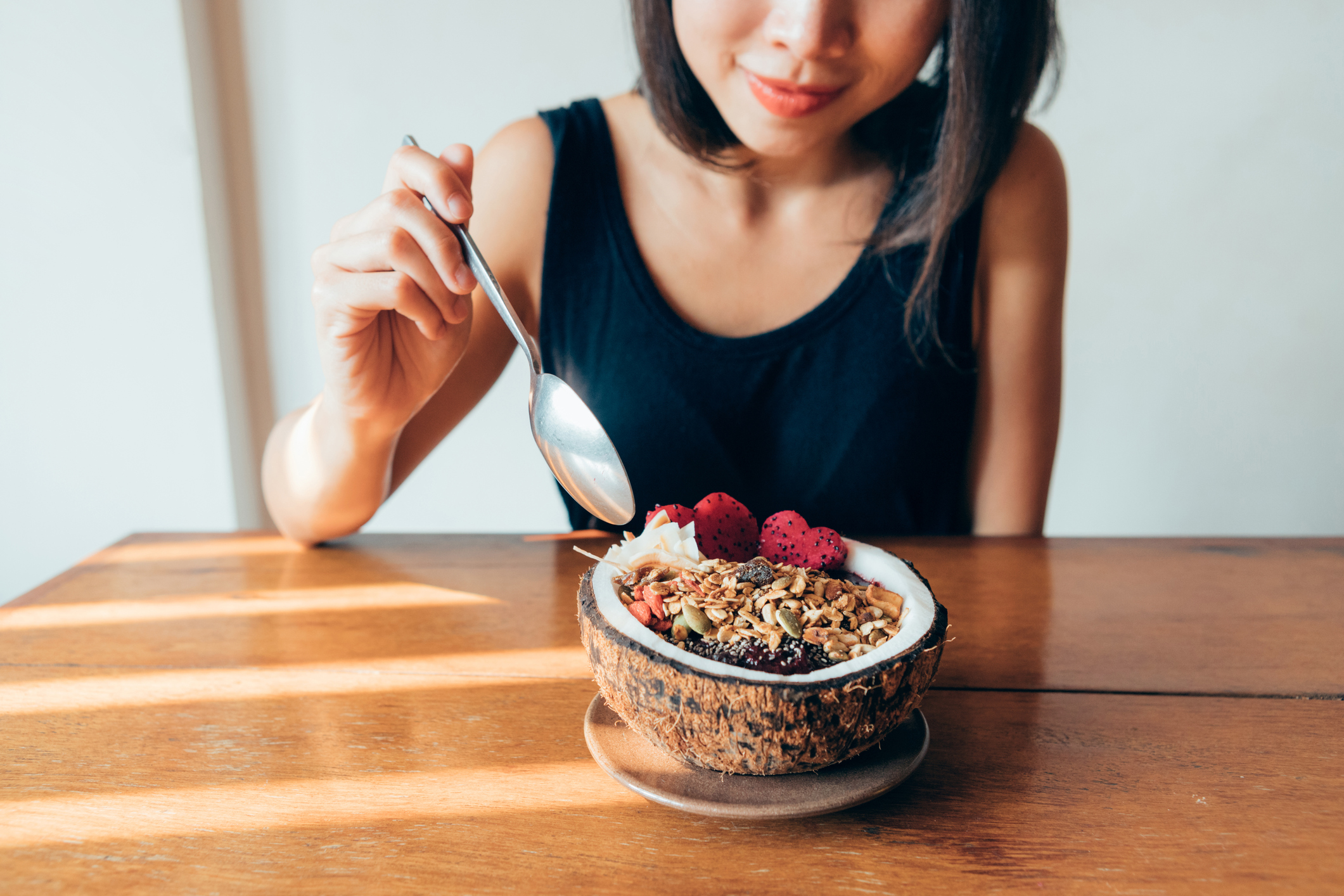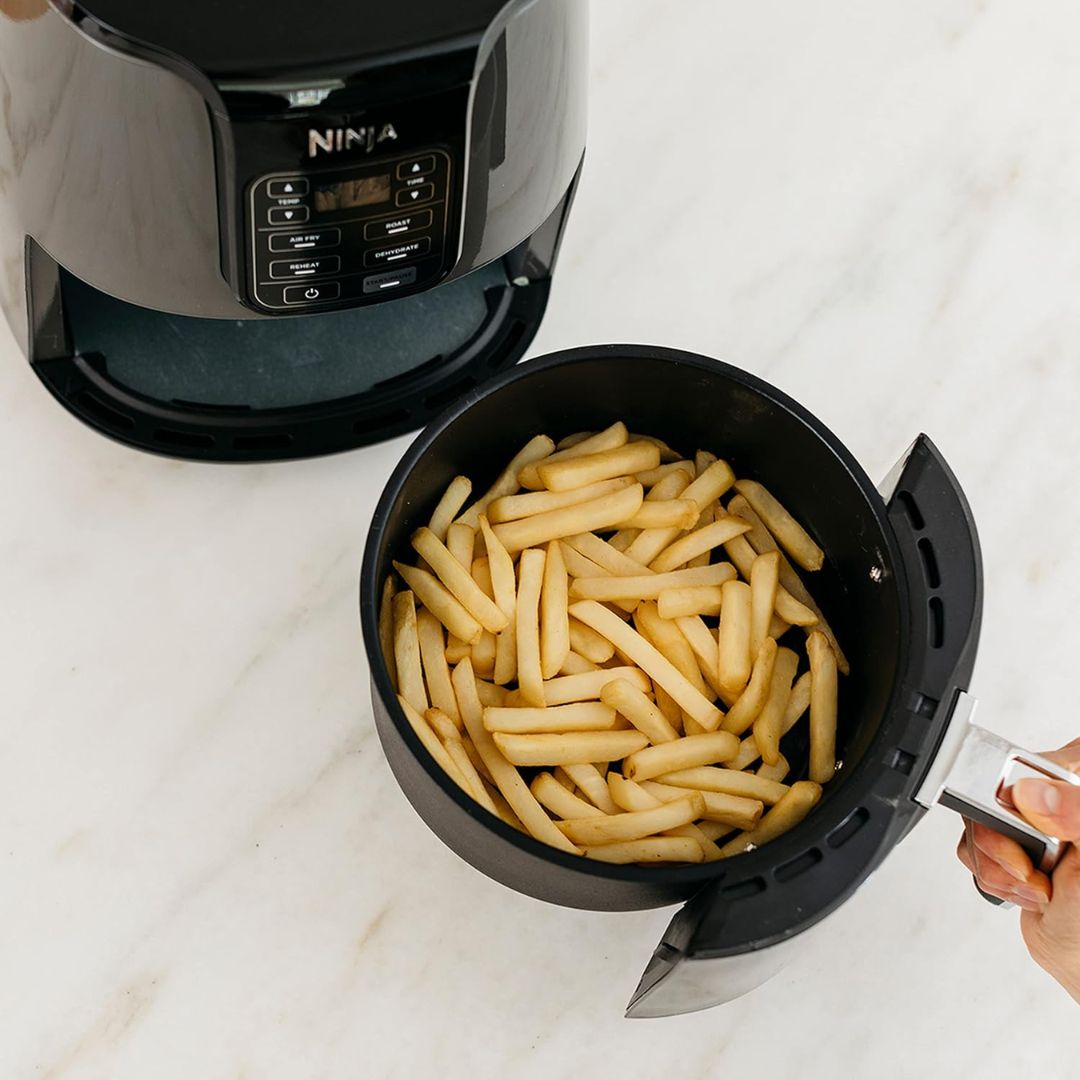9 harmful diet fads to know about, according to a nutritionist (they're probably not what you'd expect)
Atkins? Intermittent fasting? Keto? A professional debunks the common myths.

Atkins? Intermittent fasting? Keto? A professional debunks the common myths.
Question: how's your year going so far? Have you stuck to your goals for 2022, soldiered thriough Dry January, and practiced some of the self-care ideas you promised yourself you'd try this year? Good for you (and good for you if you've changed absolutely nothing, too - each to their own).
If you're actively trying to adopt some more healthy habits and lose a little weight this year, our weight loss tips from a top expert might help. Similarly, knowing which diet fads are a. potentially harmful and b. a waste of your time is really key. But there's so much misinformation out there, which is why we've enlisted the help of nutritionist Rhiannon Lambert, who's just published her second book, The Science of Nutrition, to do the explaining for you.
When you Google "best diet to lose weight", there are 193,000,000 results - many, quick fixes from unqualified individuals claiming to be pros. It highlights the wealth of information out there claiming to be the solution for you, despite no two bodies being the same. "One analysis of 14 popular diet programmes found that the majority of quick-fix weight loss routines were reversed after 12 months," she explains. "The range of "quick fix" and "miracle fads" can seem tempting and come with promises of fast weight loss but sadly, any promise of quick weight loss is a red flag, as often they are unrealistic and unsustainable."
Bottom line? There is no magic solution to fat loss and some of the common diet fads can do more harm than good. Keen to read up on the most harmful diet fads to swerve? Keep scrolling.
9 common diet fads and myths to be wary of:
Lambert shares that there is a whole range of diet fads and myths and misconceptions about weight loss. These include:
1. All calories are equal
You'll have heard this one before. Many PT's, nutritionists, and pros claim that all calories are equal, but Lambert disagrees.
Marie Claire Newsletter
Celebrity news, beauty, fashion advice, and fascinating features, delivered straight to your inbox!
"Not all calorie sources have the same effect on your health and weight," she explains. "Different foods go through different metabolic pathways, and have different effects on hormones and hunger that both regulate body weight," she goes on.
Think of it this way: we eat food, not numbers. For example, a processed cheese sandwich with 500kcals isn't the same as a homemade sandwich of 500kcals. Why? Because, with the processed cheese sandwich, you absorb all 500kcal of it, whereas, with the homemade sandwich, you'll only absorb 410kcal, simply because of the way the food is produced.
2. Supplements can aid fat loss
Know this: the fat loss supplement industry is massive. "Most supplements for weight loss are ineffective and can be dangerous," she warns. "Many people, unfortunately, fall for these marketing tactics."
3. Fat loss is as simple as eating less, moving more
Just telling people who are struggling with weight problems to eat less and move more is often ineffective, shares Lambert. "It's much like telling a person who is depressed to cheer up."
"Most people who follow this advice end up regaining weight due to biochemical and physiological factors," she shares.

4. You're healthy if you are a certain weight
Desptie NHS weight guidelines dictating BMI as an indicator of good health, this isn't quite true. You can eat healthily, exercise regularly and still weigh in at overweight, simply because you are carrying more muscle mass, for example.
"As we know the numbers don’t tell the whole story," explains Lambert.
5. Eating too much fat makes you fat
This one is common but again, not quite correct. "Fat is often blamed for the obesity rise," explains the nutritionist. "Fat provides around 9 calories per gram compared to four calories per gram of carbs or protein, so sure, it's calorie dense, but as long as your calorie intake is within a healthy range, fat won't make you fat."
Simply put, it's just another thing contributing to your total calorie intake: fat alone doesn't cause weight gain. "Quite the opposite: we all need fat for our bodies to function properly."
6. The influencer you follow on Instagram's diet will work for you
There is no "one size fits all" when it comes to dieting - every body is unique.
"Rather than following a formal diet plan, fixate on calories or avoid particular foods, find a way of eating that works for you and your needs. It's the simplest way to reach and maintaining a healthy weight," she shares.
This may mean seeking some professional help - not just copy people online's workout routines, diets and healthy habits."We need to stop listening to blanket diet approaches from people who aren't medical professionals, registered nutritionists or dietitians and who have a great amount of scientific-based knowledge to support sustainable fat loss," she stresses.
The Science of Nutrition: Debunk the Diet Myths and Learn How to Eat Well for Health and Happiness by Rhiannon Lambert
£14.53
7. Weight loss is purely about calories
Did you know? One study has demonstrated that the quality of the food you eat is an important factor in achieving and maintaining a healthy weight. Not sure what that means? Eating a diet of cereal - we're looking at you, Special K - actually isn't as effective for weight loss as eating a variety of fruits, vegetables and so on, despite appearing to be lower calorie.
That's because your body responds best to foods high in fibre, vitamins and minerals, and a diet without any of those things could lead to malnutrition. "You have to consider the overall nutritional profile of food," she explains.
Don't miss our guides to workout recovery, mindful movement, and how to stay healthy on a budget, while you're here.
8. Skipping meals is the easiest way to reduce your food intake
Tried this one before? It's not fun - or sustainable. "Studies support slow, steady weight loss over a long period of time as the most effective way to lose body fat," Lambert shares.
Try this: Instead of just skipping meals and risking fatigue, potential bingeing, and cravings, aim to control your portion sizes at each meal and choose nourishing snacks in between.
9. Short-term fixes will last long term
One size will never fit all or for what we should all be eating, and short-term solutions often lead to long-term issues.
"Some classic examples of diets fads include juice cleanses, the Keto diet, the Alkaline diet, and the blood type diet," she details. "These diets aim to promote quick weight loss results, however, they don't have any robust scientific evidence to support the claims and can be far too restrictive."
Not to mention the fact they often only consist of expensive and unnecessary ingredients, food items, or supplements. "Sure, a fad, quick fix diet will often lead to initial weight loss - if you think about it, this makes sense as it'll likely be a shock to the body - but sadly this is often fluid loss instead of body fat."
Bottom line: if you are trying to lose weight, try not to listen to diet fads, weight loss culture or common myths and misconceptions. "Instead, focus on your relationship with your food, body, and mind, and favour evidence-based changes which offer long-term solutions," shares the nutritionist.

What actually is a diet?
If you are considering going on a "diet" of any form, it's important first to know exactly what that means. "Individuals go on diets for many reasons," shares the expert. "Some may be advised to lose weight or told to pay attention to their eating habits by a medical professional. However, it's more common for people to self-prescribe themselves a diet to follow for aesthetic reasons," she goes on.
"Social media, the mainstream media, and even family and friends can often influence someone’s dietary choices and whether or not they start a diet," she explains.
In the nutrition world, she explains that the word "diet" simply means the total amount of food consumed by an individual to provide nourishment and fuel. "However, in recent years, society molded "diet" to mean having a direct intention to lose weight."
And what diets actually work for fat loss?
- Eating a balanced nourishing diet
- Practicing portion control
- Eating "less healthy" foods you enjoy on occasion rather than every day - everything in moderation is far more effective than deprivation
- Listening to your body - that is, eating when you're hungry and stopping when you are full
- Managing your stress
- Getting enough sleep.
"Dieting can set up a mindset of succeeding or failing which may then lead to potential harmful yoyo dieting," she explains. "Numerous studies have observed that when some people try to lose fat, their bodies appear to hold onto fat and may not let them either reach a target weight or sustain it long term. A gradual process is more effective."

Ally Head is Marie Claire UK's Senior Health and Sustainability Editor, nine-time marathoner, and Boston Qualifying runner. Day-to-day, she heads up all strategy for her pillars, working across commissioning, features, and e-commerce, reporting on the latest health updates, writing the must-read wellness content, and rounding up the genuinely sustainable and squat-proof gym leggings worth *adding to basket*. She also spearheads the brand's annual Women in Sport covers, interviewing and shooting the likes of Mary Earps, Millie Bright, Daryll Neita, and Lavaia Nielsen. She's won a BSME for her sustainability work, regularly hosts panels and presents for events like the Sustainability Awards, and is a stickler for a strong stat, too, seeing over nine million total impressions on the January 2023 Wellness Issue she oversaw. Follow Ally on Instagram for more or get in touch.
-
 Penn Badgley and Blake Lively kept their breakup a secret from the Gossip Girl cast and crew - here's what we know about their former relationship
Penn Badgley and Blake Lively kept their breakup a secret from the Gossip Girl cast and crew - here's what we know about their former relationshipBy Jenny Proudfoot
-
 Spring has finally sprung - 6 best outdoor workouts that are totally free and boost both body and mind
Spring has finally sprung - 6 best outdoor workouts that are totally free and boost both body and mindSoak in the nature and boost Vitamin D *and* endorphins.
By Anna Bartter
-
 This iconic rose perfume is a compliment magnet—it makes me feel ‘put together’ after just one spritz
This iconic rose perfume is a compliment magnet—it makes me feel ‘put together’ after just one spritzGrown-up and elegant, yet not at all dated.
By Denise Primbet
-
 We're fitness experts who've spent 100's of hours testing fit kit - these are the lululemon products we rave about to family and friend
We're fitness experts who've spent 100's of hours testing fit kit - these are the lululemon products we rave about to family and friendKeen to invest in kit that'll last the long run?
By Chloe Gray
-
 After testing dozens of designs—these are the best air fryers money can buy, according to team Marie Claire UK
After testing dozens of designs—these are the best air fryers money can buy, according to team Marie Claire UKPlus a nutritionist's expert insights on the popular cooking method
By Grace Lindsay
-
 This Pilates ab workout is a combination of all the most effective exercises for a strong body
This Pilates ab workout is a combination of all the most effective exercises for a strong bodyThis one's a good'un.
By Ally Head
-
 These are the only bodyweight exercises experts reckon are *actually* effective
These are the only bodyweight exercises experts reckon are *actually* effectiveTry from home, the garden, or the gym.
By Ally Head
-
 This is the best HIIT workout you can do, according to world-renowned trainer Kayla Itsines
This is the best HIIT workout you can do, according to world-renowned trainer Kayla ItsinesYep, you can do it from home.
By Ally Head
-
 A diabetes drug is going viral for its supposed weight loss benefits—but there’s a seriously dark problem here
A diabetes drug is going viral for its supposed weight loss benefits—but there’s a seriously dark problem hereSearches for weight loss injections have soared by 134%.
By Ally Head
-
 Cold water therapy is loved by Lizzo and Harry Styles - here's how it could boost your energy, fitness and more
Cold water therapy is loved by Lizzo and Harry Styles - here's how it could boost your energy, fitness and moreLearn all about why the Wim Hof method could be worth introducing into your day-to-day.
By Ally Head
-
 Dumbbell exercises are loved by Rihanna and the Kardashians - 10 to try tonight
Dumbbell exercises are loved by Rihanna and the Kardashians - 10 to try tonightOur weight training experts have got you covered.
By Amy Sedghi
